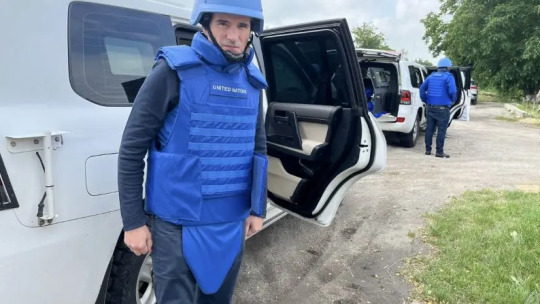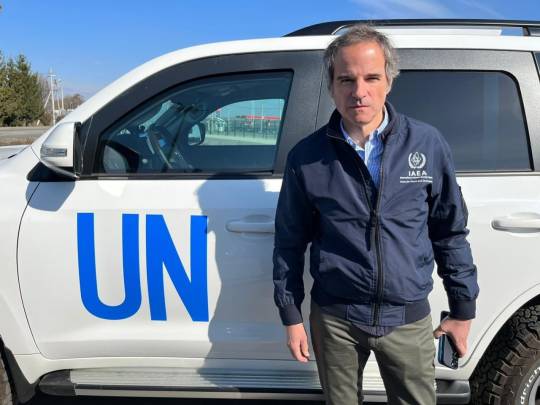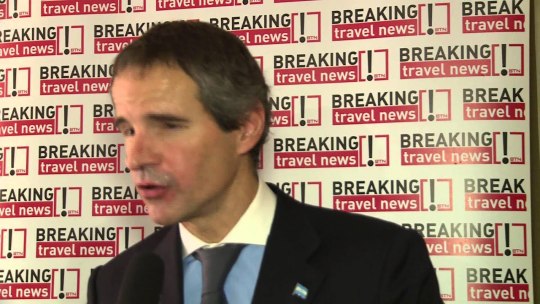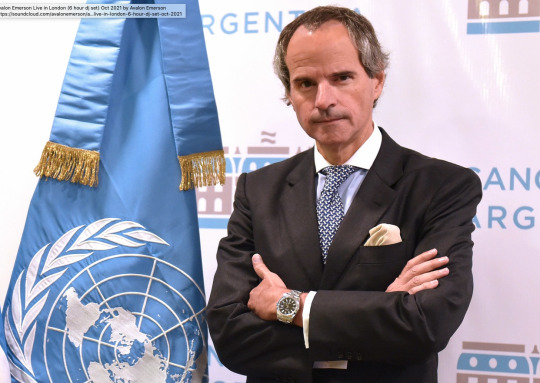#Rafael Grossi
Explore tagged Tumblr posts
Text




⚡️Гендиректор МАГАТЕ Рафаель Гроссі та очільник Міненерго Германом Галущенко відвідали місця пошкодженої енергетичної інфраструктури України.
📢"Я перебуваю на підстанції "Київська" — важливій для ядерної безпеки ланці енергомережі України. Ядерна аварія може бути наслідком прямого нападу на станцію, а також через порушення електропостачання", — розповів Гроссі у соцмережі "Х".
📸: фото з соцмереж
#ukraine#україна#енергетика#магате#рафаель гроссі#міненерго#герман галущенко#електропідстанція#київщина#київська область#енергетика України#енергосистема#Iaea#rafael grossi#energo#atomic energy#russian invasion of ukraine#russian agression#russian crimes#russian imperialism#russian war crimes#російські воєнні злочини#критична інфраструктура
9 notes
·
View notes
Text
Russian drone attacked an IAEA vehicle on its way to the temporarily occupied Zaporizhzhia Nuclear Power Plant.
IAEA Director General Rafael Grossi condemned the act, calling it “unacceptable.”
14 notes
·
View notes
Text
Chefe da AIEA visita Ucrânia para discutir segurança nuclear'
Kiev, Ucrânia, 6 de fevereiro de 2025, Agência de Notícias da Ucrânia – O diretor-geral da Agência Internacional de Energia Atômica (IAEA), Rafael Grossi, esteve em Kiev para tratar da segurança da usina nuclear de Zaporizhzhia, situada em território ucraniano, mas sob controle russo. A reunião com autoridades ucranianas abordou os riscos enfrentados pela instalação e a necessidade de medidas…
0 notes
Text
IAEA head arrived in Russian city of Kaliningrad
The head of the International Atomic Energy Agency (IAEA) Rafael Grossi arrived in Kaliningrad to discuss the situation at Zaporizhzhia Nuclear Power Plant.
Grossi arrived in the Russian city on Tuesday, May 28, to meet with a Russian interdepartmental delegation. The Russian State Atomic Energy Corporation (Rosatom) stated that its CEO Alexey Likhachev chaired the Russian delegation at the meeting, which began at the VIP lounge of Kaliningrad’s Khrabrovo airport.
Over the past year and a half, the head of the UN nuclear service has visited Russia several times. The meetings took place in Moscow, St Petersburg, Kaliningrad, and Sochi.
In March, Grossi visited Sochi, where he met with Russian President Vladimir Putin. During the conversation, the IAEA chief called for maximum military restraint around the nuclear power plant. They also discussed broader co-operation between Russia and the IAEA.
Zaporizhzhia NPP is the largest in Europe and one of the 10 largest plants in the world. It came under Russian control in March 2022, shortly after the outbreak of war in Ukraine in February of the same year.
Since then, fears of nuclear disaster persist as both sides of the conflict accuse each other of shelling near the plant. Russian media reported an attack by Ukrainian kamikaze drones on the plant’s transport workshop on May 22. In April, Russia accused Kyiv of attacking the reactor building.
Read more HERE

#world news#world politics#news#russia#russia news#russian news#russia politics#russian politics#nuclear plant#nuclear power#zaporizhzhia#iaea#rafael grossi#grossi
0 notes
Text
Russia spreads lies that tonight Ukrainian Armed Forces are going to strike ZNPP with a "missiles filled with radioactive waste". You know what it means. If they started a campaign of misinformation and blame shifting, they are planning to blow up the nuclear plant sometime soon.
And I know for sure that, as in the case of the Nova Kakhovka dam Russians blew up, there will be many people willing to believe that Ukraine is deliberately destroying its own territory and kiling its people. Tucker Carlson will make another video where he explains how Ukraine is killing itself, "independent" Western journalists will write about this crime as a "catastrophe in which both sides blame each other", like nothing's clear, maybe Ukraine really nuked itself, who the fuck knows.
Rafael Grossi (the head of the The International Atomic Energy Agency) will once again gladly shake hands with the Russian terrorists who seized the NPP and are storing explosives there (I love how we all sorta forgot how fucking insane it is that russia is allowed to do this), while other IAEA employees will once again give the occupiers warm hugs.


The only hope is that something will happen behind closed doors that will force Kremlin to change their plans. Maybe they are bluffing like they did last year with the "dirty bomb" nonsense. One can hope.
474 notes
·
View notes
Text
Hey everyone, in case you haven't heard Russia is planning to blow up the nuclear power plant in Zaporizhzhia in a terrorist attack, which can place the whole continent of Europe in danger due to radiation, if not the entire planet. Please help spread awareness
Russia is trying to deny this information, claiming they won't do that, but a month back Ukraine claimed Russia had plans for a terrorist attack on a dam in Kakhovka, they denied the allegations and then the dam was blown up, killing and displacing thousands of Ukraine civilians and animals. I'm sorry to be bringing such a grim topic on my blog, but Please help spread awareness
#russia#ukraine#russia ukraine war#russia terrorist state#nova kakhovka dam#zaporizhzhia nuclear power plant
183 notes
·
View notes
Text
Ukraine's parliament has given the green light for the acquisition of two nuclear reactors initially intended for Bulgaria's Belene Nuclear Power Plant (NPP), according to Reuters. These reactors are set to be used at the Khmelnytskyi nuclear facility, which has been operating at only half capacity since the Chernobyl disaster, a Ukrainian lawmaker revealed.
The decision follows discussions led by Rafael Grossi, the head of the International Atomic Energy Agency (IAEA), during his recent visit to Ukraine. Grossi outlined the agency's support in providing technical expertise and nuclear safety advice for the new reactors at Khmelnytskyi. Additionally, the reactors planned for the Ukrainian NPP will be able to run on American-made fuel, as confirmed by the American company Westinghouse.
3 notes
·
View notes
Text

Buone notizie dalla Germania! Ormai i responsabili delle industrie sono alla disperazione; prezzi dell'energia alle stelle causa mancanza di generazione rinnovabile e massicce importazioni dai Paesi di confine. Paesi di confine che, causa carenze determinate dalla potenza assorbita proprio dalla Germania, vedono la loro energia elettrica schizzare alle stelle. Un cane che si morde decisamente la coda e senza vie di uscita, mentre sembrano ancora adesso profetiche le espressioni di Rafael Mariano Grossi, leader della IAEA: "La Germania non potrà fare a meno del nucleare, diversamente conoscerà lo spopolamento industriale". Intanto la società tedesca, il popolo, è in rivolta per i costi insostenibili dell'energia elettrica. Energiewende? Wendefumo...
Dal 2 all'8 novembre e dal 10 dicembre al 13 dicembre, l'approvvigionamento elettrico della Germania da energie rinnovabili è crollato a causa di una tipica situazione climatica invernale con una pausa del vento e un irraggiamento solare minimo che ha portato a carenze di approvvigionamento, elevate importazioni di elettricità e prezzi dell'elettricità alle stelle.
A volte, è stato necessario importare oltre 20.000 MW (20 GWe, pari a 20 reattori nucleari di medio-elevata potenza), più di un quarto del fabbisogno elettrico della Germania. I prezzi dell'elettricità sono aumentati di dieci volte (93,6 €ct/kWh).
https://t32b8e15b.emailsys1a.net/c/200/7972759/1101/0/11169274/5390/530680/08d47d514b.html
Le aziende che non avevano contratti a lungo termine hanno dovuto cessare la produzione. Wolfgang Große Entrup, amministratore delegato dell'Associazione tedesca dell'industria chimica (VCI): "È una situazione disperata. Le nostre aziende e il nostro paese non possono permettersi una produzione in condizioni di solo bel tempo. Abbiamo urgente bisogno di centrali elettriche che possano intervenire ed operare in sicurezza".
l motivo: il governo di coalizione a guida socialista/verde e i precedenti governi Merkel avevano dismesso 19 centrali nucleari (il 30% della domanda di elettricità della Germania) e 15 centrali a carbone sono state disconnesse dalla rete solo il 1° aprile 2023. Sono 4,35 miliardi di euro di denaro dei contribuenti in premi di disattivazione sono stati distribuiti a RWE e LEAG (Germania dell'Est): il danno e la beffa!
Nel gennaio 2025, la centrale elettrica Weisweiler di RWE andrà offline. Questo, tra tutti i mesi, avverrà a gennaio, quando il consumo di elettricità in Germania è al massimo e la Francia potrebbe avere poco da fornire.
Questo perché la Francia è il paese più sensibile al calore in Europa e anche piccole fluttuazioni di temperatura possono avere un impatto sul consumo di elettricità a causa dell'uso diffuso di sistemi di riscaldamento elettrico. Anche e solo 1°Celsius in meno e il consumo in Francia aumenta di 2400 megawatt (2,4 GWe).
Ma la politica energetica, sbagliata, della Germania, che prevede di spegnere l'energia elettrica di sicurezza (il back-up a carbone e le centrali turbogas "di scorta"), sta ora causando difficoltà economiche a tutti.
La Norvegia meridionale, la Svezia meridionale, l'Austria e i Paesi Bassi hanno registrato prezzi dell'elettricità altrettanto alti come quelli della Germania durante la stasi della generazione delle fonti rinnovabili.
Anche la Danimarca, il cui approvvigionamento di energia elettrica si basa sull'energia eolica (56%), ha esacerbato il malessere importando elettricità dalla Scandinavia.
Il ministro dell'Energia norvegese nel governo di centro-sinistra, Terja Aasland, vuole tagliare il cavo elettrico verso la Danimarca e rinegoziare i contratti elettrici con la Germania. Sta quindi rispondendo alle richieste del Partito del Progresso, di destra, che lo chiede da molto tempo e probabilmente vincerà le prossime elezioni. Secondo il Partito del Progresso, "l'infezione dei prezzi" dal sud deve essere fermata e il prima possibile.
Il ministro svedese dell'Energia Ebba Busch è stato ancora più chiaro: "È difficile per un'economia industriale fare affidamento sulla benevolenza degli dei del tempo per la sua prosperità".
E direttamente alla politica verde di Habeck: "Nessuna volontà politica è abbastanza forte da scavalcare le leggi della fisica, nemmeno quella del signor Habeck".
https://t32b8e15b.emailsys1a.net/c/200/7972759/1101/0/11169274/5390/530709/a3eea7ba77.html
Spesso si dimentica anche che le turbine eoliche consumano elettricità quando sono ferme o spente per motivi atmosferici. Questo perché tutti le componenti tecniche (pompe dell'olio, ventole di raffreddamento, sistemi di controllo e di riscaldamento del lubrificante, ecc.) devono rimanere in funzione anche quando le turbine non generano energia. Vestas specifica un consumo di energia elettrica di 55.000 kWh (o 55 MWh) all'anno per una turbina da 4,2 MW a veicolo fermo.
https://t32b8e15b.emailsys1a.net/c/200/7972759/1101/0/11169274/5390/530749/be86328178.html
Durante i periodi di produzione, la turbina si rifornisce di energia elettrica dalla sua stessa generazione, ma le turbine sono praticamente inattive 120 giorni all'anno.
Se ipotizziamo un autoconsumo medio di 40.000 kWh (o 40 MWh) all'anno per tutte le turbine tedesche, arriviamo a 1,2 TWh, la generazione di una centrale elettrica a gas di medie dimensioni.
Per esemplificare le conseguenze della mancanza di funzionamento e generazione delle turbine eoliche, si dovrebbe mantenere operativa una centrale elettrica di circa 400 MWe, o la stessa potenza dovrebbe essere importata per giorni e giorni, per evitare che le turbine eoliche si guastino causa freddo/caldo ambientale!
https://klimanachrichten.de/2024/12/20/fritz-vahrenholt-findet-die-gescheiterte-energiepolitik-nach-den-wahlen-ihre-fortsetzung/
Fernando Arnò.
#truffa energetica#truffa climatica#truffa rinnovabili#Verdacci#Verdi di merda#Coglioni teutonici#W Nuke
2 notes
·
View notes
Text
On Wednesday, hikers around the southern Israeli city of Arad discovered the remains of an Iranian ballistic missile from the April 13 overnight assault. Israel’s Channel 11 identified it as a Khader-1 missile. The Khader-1, like the Imad missiles, which Iran also used in its strike, are nuclear capable.
The fact that Iran used two ballistic missiles capable of carrying nuclear warheads should sound every alarm bell. In an interview with Deutsche Welle on Tuesday, International Atomic Energy Agency chairman Rafael Grossi said that Iran is “weeks rather than months” away from having enough enriched uranium to develop a nuclear bomb.
Israel’s war is not a war of choice. It isn’t a conflict that Israel can shrug its shoulders and walk away from, or opt for a limited goal of blocking incoming strikes. This is a war for national survival. Hamas made clear the genocide it aims to achieve on Oct. 7. Its appalling cruelty to the hostages it has held captive for more than six months demonstrates still further that there is no way to fight to a draw with this jihadist terror regime. There is no “deal” to be had with Hamas leaders. The same is true of Hezbollah-controlled Lebanon. And, of course, the same is true of Iran.
Hamas, Hezbollah, Iran and their terror partners have used all the resources at their disposal to expand their capacity to annihilate Israel. They have not done this to jockey for stronger negotiating positions. They are putting everything they have into building these capacities because they really want to destroy Israel and kill the Jews. The calls for Israel’s destruction are not mere slogans. They are solid commitments.
The good news is that Israel has the military and economic power to defeat its enemies completely. The bad news is that in their efforts, Iran, Hamas, Hezbollah and their other partners are not fighting alone. While the United States and other Western nations are willing to speak out against Hamas and Iran from time to time, they completely oppose Israel’s effort to defeat its enemies. Israel is permitted to defend against incoming attacks. But it is prohibited from taking decisive offensive action.
To block Israel from winning, the United States and its partners in Europe and the United Nations are waging an unprecedented, comprehensive and ever-escalating political war against Israel. Its clear goal is to criminalize Israel’s war effort and to effectively deny the Jewish state the right to self-defense.
Consider the news from the International Criminal Court at The Hague. Israel is not a member of the ICC. But to seize jurisdiction over Israel, the ICC took the legally dubious step of accepting “Palestine” as a member state. Since Oct. 7, the Palestinian Authority has deluged the ICC with war crimes complaints against Israel, even though they lack evidentiary basis. But they are supported politically by a slew of anti-Israel NGOs, and the U.N.’s institutionally anti-Semitic governing apparatus and agencies.
Early this week, rumors began to swirl that ICC chief prosecutor Karim Khan is poised to act on these groundless complaints and issue international arrest warrants against Israeli Prime Minister Benjamin Netanyahu, Defense Minister Yoav Gallant and Lt. Gen. Herzi Halevi, chief of staff of the Israel Defense Forces. If Khan proceeds as reported, Israel’s top leaders will be unable to visit any of the ICC’s 120 member nations without first securing bilateral agreements with authorities in each country not to arrest them during their stay.
This is terrible in and of itself, of course. But the wider implication is even more dire. If Khan goes through with his plan, he will essentially declare Israel a criminal state with no right to self-defense.
Given that Israel is in the midst of a terrible war for its national survival, by denying Israel the right to self-defense, the ICC will deny Israel the right to continue to exist. Moreover, the ICC will have made it the position of the international community that the Jewish state must be destroyed.
The United States is not a member of the ICC. All the same, Khan owes his election to the support he received from Washington. To repay the favor, Khan closed two ICC investigations into alleged U.S. war crimes related to the American war in Afghanistan shortly after he assumed office.
On Tuesday, Israel’s top political reporter, Amit Segal, revealed that “very senior officials” at the ICC told him that Khan’s initiative was given a “green light” by the Biden administration.
“There is no way the chief prosecutor would decide on such a dramatic step, in a war still ongoing—with very little evidence—without first getting at least a ‘green light’ from the Americans,” Segal cited his sources as saying.
If their allegation is true, Segal noted, then “this is yet another unprecedented low in relations between Israel and the United States at a very sensitive time on the eve of the ground operation in Rafah.”
Listing Israel as a major human-rights abuser
Rafah is the heart of the story. For months, it has been clear that the key to Israel’s victory in its war against Hamas is the seizure of Rafah, Hamas’s final outpost, strategically located along the border with Egypt.
For months, U.S. President Joe Biden and his top officials have done everything to block Israel from seizing the city. They insisted that Israel was responsible for the welfare of the 1.4 million Gazans in the city and that Israel had to evacuate them. They also prohibited Israel from opening the border with Egypt to permit Palestinians to leave Gaza and seek safety in third countries.
Rather than argue, Israel purchased tens of thousands of tents and has set them up for the Gazans leaving Rafah in a safe area.
As the clock ticks down to the operation, the United States has ratcheted up its slanderous claims against Israel. USAID administrator Samantha Power accused Israel of deliberately inducing a “famine in northern Gaza.” The United States made resupplying Gaza its primary war effort. Never mind that Gaza may be the best-stocked enclave on earth with aid packages selling for pennies in open markets. On Monday, Biden announced that America is providing $1 billion to Gaza and pointed an accusatory finger at Israel.
“We’re going to immediately secure that aid, and surge it, surge it, including food, medical supplies, clean water. And Israel must make sure this aid reaches the Palestinians in Gaza without delay,” Biden barked.
The massive quantities of supplies entering Gaza daily have enabled Hamas to ready itself for the coming battle and to restore its control over all aspects of civilian life in the area. It has also enabled Hamas cells to quickly reinstate themselves in areas that IDF forces vacate, forcing soldiers to retake areas time after time.
Ahead of the news of the ICC initiative, the U.S. State Department informed the media of its intention to sanction an entire IDF unit, manned by soldiers on the ultra-Orthodox spectrum. The State Department also expanded U.S. sanctions against Israeli civilians in Judea and Samaria to include organizations and individuals fingered by anti-Israel NGOs in the United States and the Palestinian Authority that seek to delegitimize Israel’s right to exist.
This week, the State Department issued its annual Human Rights Report for 2023. The report places Israel together with Russia, China and the Taliban as major human-rights abusers. The State Department’s assault on Israel flies in the face of in-depth reports from U.S. and British military experts that have detailed how Israel has gone to lengths to prevent civilian deaths that are unprecedented in the history of warfare. The ratio of civilian to combatant deaths in Gaza is at most 1.3:1, the lowest in history, they have shown.
Like the threat of ICC arrest warrants, all of these shockingly hostile U.S. actions are directed towards the goal of criminalizing Israel’s war effort and intimidating Israel’s leaders into canceling the operation in Rafah, suing for a hostage deal that will lead to Israel’s strategic defeat and securing Hamas’s survival and Iran’s strategic victory and emergence as the uncontested regional hegemon—on the cusp of a nuclear arsenal.
‘More has to be done’ to fight antisemitism
The administration-directed onslaught is buffeted by the anti-Jewish, pro-Hamas pogroms at campuses from coast to coast. The symbiotic relationship between the vilification of Israel by the U.S.-led international community in support of Hamas’s survival and Israel’s defeat, coupled with the assault on Jews at universities, is forcing a choice on us all. A video address on Wednesday drew the link explicitly.
Noting that many leading universities have enabled the antisemitic violence on their campuses, Netanyahu said “more has to be done,” to fight antisemitism.
“It has to be done not only because they attack Israel. That’s bad enough. Not only because they want to kill Jews wherever they are. That’s bad enough. It’s also … because they say not only ‘Death to the Jews,’ but ‘Death to America.’ And this tells us that there is an anti-Semitic surge here that has terrible consequences.
Explaining the connection between events in the war on the ground and assaults on Jewish students and faculty, Netanyahu said: “We see this exponential rise of antisemitism throughout America and throughout Western societies as Israel tries to defend itself against genocidal terrorists. Genocidal terrorists who hide behind civilians. Yet it is Israel that is falsely accused of genocide. Israel that is falsely accused of starvation and sundry war crimes. It’s all one big libel. But that’s not new.
“We’ve seen in history that antisemitic attacks were always preceded by vilification and slander; lies that were cast against the Jewish people that were unbelievable. Yet people believed them.
“And what is important now is for all of us, all of us who … cherish our values and our civilization to stand up together and to say: Enough is enough.
“We have to stop antisemitism because antisemitism is the canary in the coal mine. It always precedes larger conflagrations that engulf the entire world. So I ask all of you, Jews and non-Jews alike who are concerned with our common values and our common future to do one thing: Stand up. Speak up. Be counted.”
Israel’s choice is between defeating its enemies on the battlefield even at the cost of terrible condemnation and isolation or collapsing under pressure and losing. Israel is called to make this choice in the immediate term, and its fate stands or falls with its decision about Rafah.
But while the focus is on Israel, the choice belongs to all who seek to preserve their freedom and safety. Will you stand with Israel, and by doing so, protect your own freedom and rights, or will you sacrifice both by staying silent?
4 notes
·
View notes
Text
Meduza: ZNPP in danger again: Since August 2022, Ukraine’s Zaporizhzhya Nuclear Power Plant has suffered eight events with a complete loss of off-site power, until today, when the station lost the connection to its only remaining back-up power line amid renewed military activity in the area, according to the International Atomic Energy Agency. “Europe’s largest nuclear power plant has lost a key source of the electricity it needs to cool its reactors as well as for other essential nuclear safety and security functions,” Director General Rafael Mariano Grossi warned.
6 notes
·
View notes
Text
Russia Bars Ukrainian Operators From Zaporizhzhia: Jeremiah 12
March 2024By Kelsey Davenport The head of the International Atomic Energy Agency (IAEA) has raised concerns that Russia’s decision to cut staff at the Russian-occupied Zaporizhzhia Nuclear Power Plant is compromising nuclear safety and security. IAEA Director-General Rafael Mariano Grossi visited the facility on Feb. 7, a week after Russia announced that workers employed by Energoatom, the…
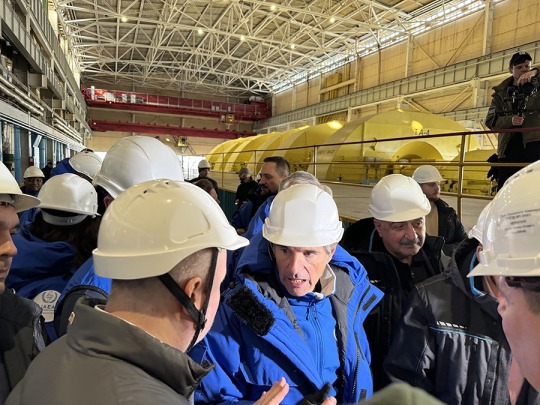
View On WordPress
#Andrew the Prophet#andrewtheprophet#Military#nuclear#Russia#the prophecy#theprophecy#ukraine#War#zaporizhzhia
8 notes
·
View notes
Text

Grossi: la situazione nella centrale nucleare di Kursk è "seria"
L'azione militare in corso nelle vicinanze della centrale nucleare russa di Kursk comporta il rischio di un “incidente nucleare”, lo ha dichiarato martedì ai giornalisti Rafael Grossi, direttore generale dell'Agenzia internazionale per l'energia atomica (AIEA).
L'alto funzionario ha visitato lunedì l'impianto situato nella città di Kurchatov, nella regione di Kursk, vicino al luogo in cui Kiev ha lanciato un'incursione su larga scala all'inizio del mese. I funzionari russi hanno in precedenza accusato le truppe ucraine di aver preso di mira l'impianto con dei droni, uno dei quali sarebbe caduto la settimana scorsa vicino al deposito di combustibile esaurito dell'impianto.
Grossi ha ribadito che la centrale nucleare di Kursk è di vecchia concezione e non include alcune delle protezioni di cui sarebbe dotato un impianto nucleare più moderno. Per esempio, non ha le cupole che proteggono i quattro reattori in caso di incidente grave, come l'impatto di un aereo.
Canale di Andrea Lucidi
Notizie da Russia e Donbass🇷🇺🇷🇺🇷🇺
Qui trovi i link a tutti i miei social
Per contribuire al mio lavoro clicca qui
6 notes
·
View notes
Text
Iran rejects US nuclear talks
On 8th March, Supreme Leader Ayatollah Ali Khamenei stated that Iran would not be pressured into negotiations. This came after US President Donald Trump announced he had sent a letter to Iran’s leadership, urging them to engage in discussions over a nuclear deal.
In an interview with Fox Business, Trump suggested there were two ways to handle Iran: military intervention or a negotiated deal to prevent Tehran from developing nuclear weapons.
Iran’s stance on US demands
At a meeting with senior officials, Khamenei said the United States was seeking to “impose their own expectations,” according to Iranian state media reports.
“The insistence by certain bullying governments on negotiations is not aimed at resolving issues,” Khamenei stated. “For them, talks are a means to introduce new demands, not just about Iran’s nuclear programme. Iran will not accept such expectations,” he added. He did not directly mention Trump.
After Khamenei’s remarks, White House National Security Council spokesperson Brian Hughes repeated Trump’s statement about two options: negotiations or military action.
“We hope the Iranian regime will prioritise the welfare of its people over supporting terrorism,” Hughes said in a statement.
Tensions over Iran’s nuclear programme and defence capabilities
Trump has expressed a willingness to reach a deal with Iran. However, he has also reinstated the “maximum pressure” strategy from his first term. This approach isolates Iran economically and aims to reduce its oil exports to zero.
In 2018, Trump withdrew the United States from the 2015 nuclear deal with Iran. The deal had placed strict restrictions on Tehran’s nuclear activities in exchange for sanctions relief. After the US withdrawal and the re-imposition of sanctions, Iran exceeded the deal’s limitations on its nuclear programme.
Rafael Grossi, head of the UN’s nuclear watchdog, has warned that time is running out for diplomatic efforts. Iran continues to enrich uranium, bringing it closer to weapons-grade levels.
Iran maintains that its nuclear programme is for peaceful purposes only.
Khamenei, who has the final say on Iran’s policies, said there was “no other way to resist coercion and bullying.”
“They are presenting new demands that Iran will not accept, such as on our defence capabilities, missile range, and international influence,” he said.
Although Tehran insists that its ballistic missile programme is defensive, the West views it as destabilising in an already volatile Middle East.
In recent months, Iran has revealed new military developments. These include its first drone carrier and an underground naval base. Tensions with the US and Israel continue to rise as Iran expands its military capabilities.
Read more HERE

#world news#news#world politics#middle east#middle east news#middle east crisis#iran#iran news#iran politics#foreign policy#iran nuclear program#iran nuclear deal#nuclear#nuclear power#nuclear energy#usa#usa news#usa politics#america#eu news#united states
2 notes
·
View notes
Text
3 notes
·
View notes
Text
IAEA Director General Statement on fire Situation in Chernobyl nuclear station
IAEA, 27 Feb 25 Two weeks after it was hit by a drone, Ukrainian firefighters are still trying to extinguish smouldering fires within the large structure built over the reactor destroyed in the 1986 Chornobyl nuclear accident, Director General Rafael Mariano Grossi of the International Atomic Energy Agency (IAEA) said today. With unrestricted access, the IAEA team based at the site has been…

View On WordPress
0 notes
